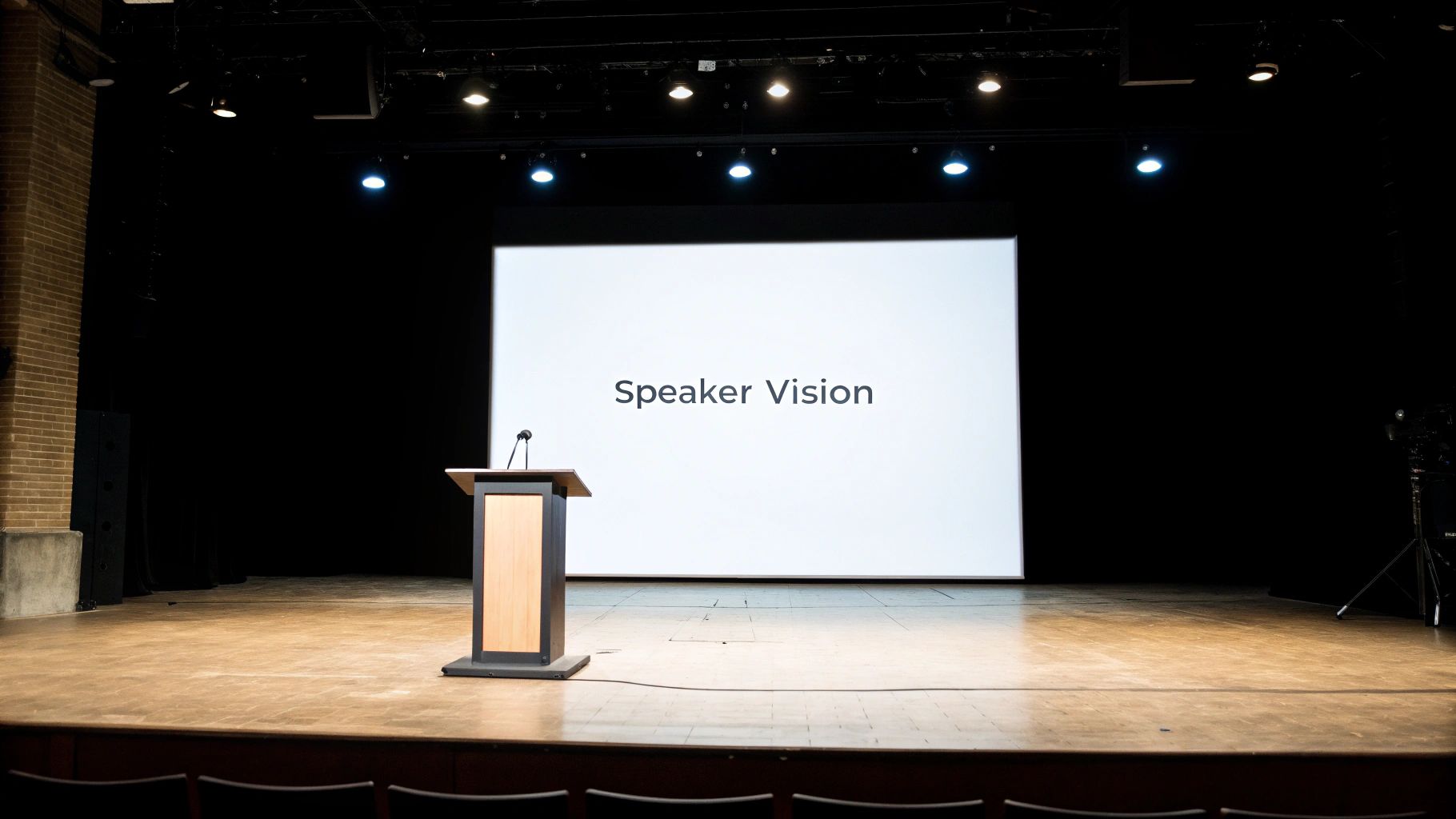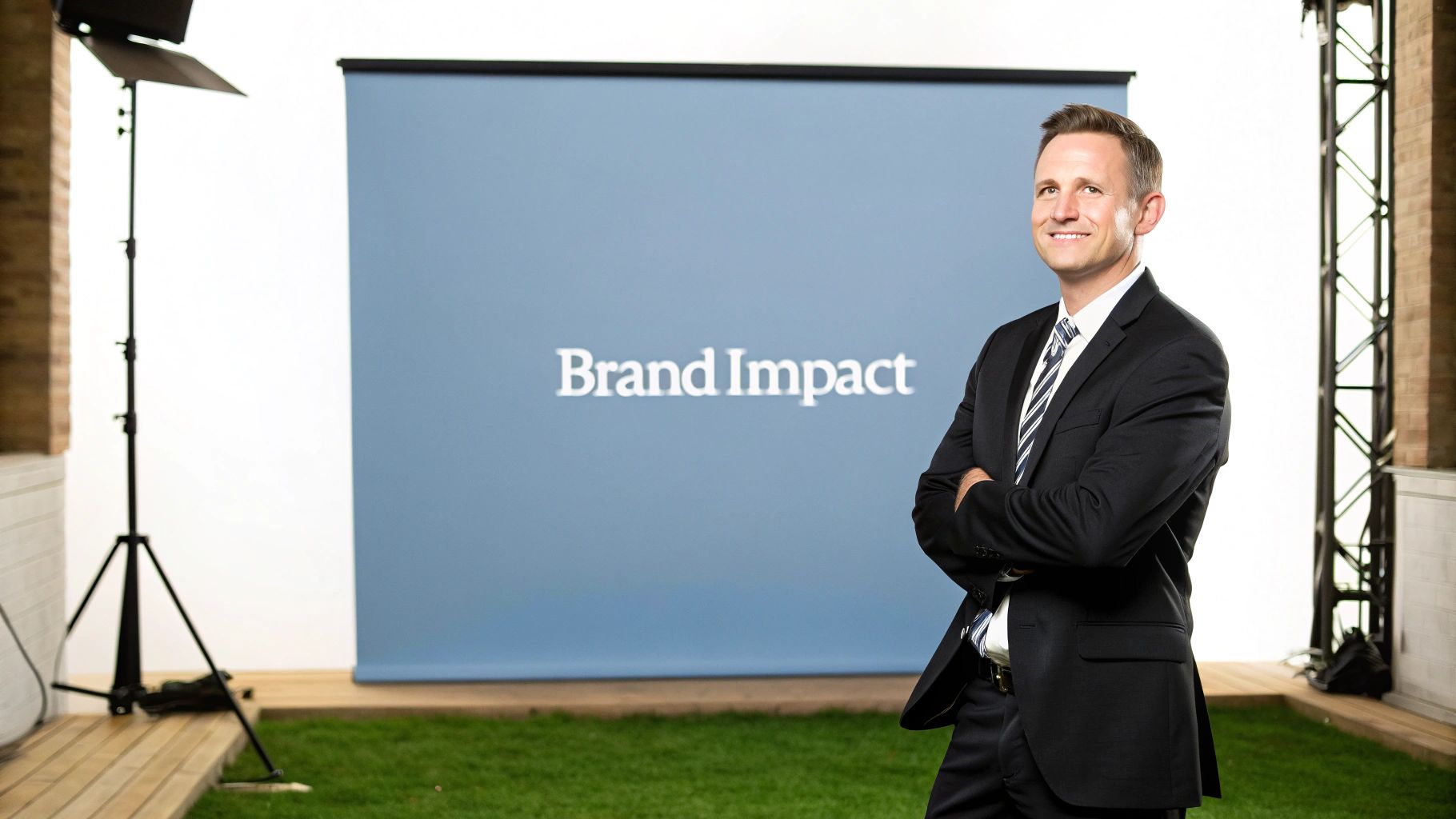
The dream of becoming a keynote speaker is enticing. The image of captivating a crowd, sharing your knowledge, and making a difference is a powerful draw. But it's important to be realistic about the journey to becoming a successful keynote speaker. This section provides a frank assessment of the speaking industry, separating fact from fiction.
One common myth is that keynote speaking is a quick route to fame and fortune. The reality is that professional keynote speaking is a challenging business. The field is oversaturated, with many speakers vying for limited opportunities.
This competitive landscape makes consistent earnings difficult. Demand for speakers doesn't always match the supply. Event organizers often prioritize celebrity over expertise. This preference for recognizable names, combined with the cyclical nature of events, can lead to financial instability for many speakers. The impact of the 2020 COVID-19 pandemic further highlighted the precarious nature of this career path, as many speakers saw bookings vanish overnight. Explore this topic further
Another misconception is that all speaking engagements are the same. Keynote speaking is distinct from other presentation formats. Workshops and breakout sessions often focus on practical skills. Keynote speeches, on the other hand, aim to inspire and motivate large gatherings. Recognizing this difference is key to tailoring your message and approach.
Despite the difficulties, opportunities exist for speakers who understand the industry. Some sectors actively seek new perspectives and original voices. Identifying your specific area of expertise and targeting the right audience are crucial. For instance, emerging fields like sustainable technology or the Metaverse often welcome speakers who can offer leading-edge knowledge and spark innovation.
Managing expectations is also essential. The income potential for keynote speakers can fluctuate. A realistic understanding of these financial variations is important. Developing diverse income sources, such as consulting or online courses, can create stability. This diversification helps cushion against the unpredictable speaking market. Ultimately, combining a passion for your message with a practical understanding of the industry is the key to building a lasting and successful keynote speaking career.

So, you’re ready to step onto the stage and make your mark as a keynote speaker. You’ve done your homework, understood the industry's demands, and prepared yourself for the challenges ahead. Now, it’s time to focus on the heart of your speaking career: developing a talk that truly connects. This isn't just about general presentation advice; it's about crafting a signature talk – a presentation that is uniquely you.
Your signature talk should be the perfect blend of what you know best and what the audience craves. Ask yourself: What specialized knowledge or unique experience do you bring to the table? Where does your passion intersect with the needs and interests of your target audience?
For instance, if you're a software engineer passionate about accessible design, crafting a talk about building inclusive digital experiences could be your sweet spot. This targeted approach helps you become a sought-after voice in a specific niche.
Data and facts are important, but audiences connect with stories. Transforming your expertise into compelling narratives is key to making your message unforgettable. Instead of simply presenting information, weave in personal anecdotes, relatable case studies, or real-world examples.
Consider the success of keynote speakers like Rachel Druckenmiller. She masterfully uses her personal health journey to resonate with audiences eager to learn about nutrition and wellness. This personal touch adds authenticity and emotional depth to your presentations.
Every compelling talk needs structure. Think of it as the architectural blueprint for your presentation. It needs a solid foundation and a clear, logical flow to guide your audience. Start with a captivating opening that grabs their attention from the first moment.
Then, present your key points in a logical sequence, supporting each one with evidence, real-world examples, and engaging stories. Finally, conclude with a powerful takeaway that leaves a lasting impression and encourages action. A simple yet effective structure includes:
Before diving into refining your talk, let's look at the current landscape of popular keynote speaking niches. The table below provides insights into audience demand, competition, and potential earnings for various topics.
Popular Keynote Speaking Niches
| Speaking Niche | Audience Demand | Competition Level | Average Fee Range |
|---|---|---|---|
| Business & Leadership | High | High | $5,000 – $20,000+ |
| Technology & Innovation | High | Medium | $4,000 – $15,000+ |
| Health & Wellness | Medium | High | $3,000 – $10,000+ |
| Personal Development | Medium | High | $2,000 – $8,000+ |
| Sustainability & Environment | Medium | Medium | $3,000 – $12,000+ |
As the table illustrates, certain niches like Business & Leadership and Technology & Innovation experience high demand, but also face significant competition. Choosing a niche that aligns with your expertise and passion is crucial for long-term success.
Your signature talk isn't a one-and-done creation. It's a living, evolving piece that benefits from continuous refinement. Don't hesitate to test your material with smaller groups and actively solicit feedback. This process helps identify areas for improvement, strengthen weaker points, and fine-tune your delivery. Even established keynote speakers like Rachel Druckenmiller emphasize the importance of ongoing feedback.
This iterative process ensures that your talk remains relevant, engaging, and impactful. With a signature talk that is both informative and captivating, you’ll be well on your way to booking more engagements and establishing yourself as a successful keynote speaker.

Starting out as a keynote speaker can feel daunting. The question often arises: how can you secure bookings without experience, and how can you gain experience without bookings? It's a classic catch-22. Fortunately, there are strategic ways to build your authority, even as a newcomer.
Before focusing on crafting the perfect keynote, take stock of your existing accomplishments. Your professional achievements are a valuable foundation for building credibility. Think about successful projects you’ve led, impactful articles you've published, or businesses you’ve built. These demonstrate your expertise and can pave the way for speaking opportunities. For example, a successful marketing campaign can position you as a marketing authority.
Not all speaking opportunities are equal. Initially, prioritize opportunities that enhance your credibility, not just the number of engagements. Consider smaller industry events, local conferences, or even webinars. These provide valuable experience and a less pressured environment to hone your skills. Think of it like a musician playing smaller venues before headlining a stadium. These smaller engagements also provide opportunities for testimonials and connections that can lead to bigger stages.
Another viable path involves transitioning from related fields, such as training. This offers a more financially stable starting point. Many established keynote speakers began their careers as trainers, using that foundation to build their speaking platforms. Learn more about transitioning from training to keynote speaking. The consistent income from training provides stability as you develop your speaking brand.
While practical speaking experience is essential, developing compelling thought leadership content is equally crucial. This showcases your expertise and attracts event planners looking for knowledgeable speakers. Consider starting a blog, contributing to industry publications, or creating engaging content on social media platforms like LinkedIn or Twitter related to your speaking topics. This establishes you as a go-to expert in your field.
Every speaking engagement, regardless of size, is a chance to gather testimonials. These act as social proof and can sway booking decisions. But credibility isn't solely about what others say about you; it’s also about the relationships you cultivate. Networking with event planners, industry influencers, and decision-makers within your target audience can unlock invaluable opportunities and referrals. Actively engage in industry events, attend conferences, and build genuine connections with key players in your field. These efforts, combined with strategically using your existing experience, create a strong foundation for a successful keynote speaking career.

Crafting a compelling keynote speech is only half the battle. Delivering it with captivating stage presence is equally important. This section explores techniques used by top keynote speakers to create truly authentic and engaging experiences.
Many aspiring keynote speakers experience performance anxiety. Even seasoned professionals often feel nervous before taking the stage. This is normal. The key is reframing that nervous energy into a force that fuels your presentation. Think of athletes channeling pre-game jitters to enhance their performance. This mindset shift can transform anxiety into excitement.
Your voice is your primary tool as a keynote speaker. Varying your tone, pace, and volume keeps your audience engaged. A monotonous delivery can lose their attention, regardless of content brilliance. Lowering your voice creates intimacy, while strategically raising it emphasizes key points and energizes the room. Practice these vocal variations for a dynamic presentation.
Your physical presence speaks volumes. Maintaining eye contact, using purposeful gestures, and moving confidently (when appropriate) impacts your audience's perception. Practicing these techniques helps command the stage and project confidence, regardless of venue size.
Public speaking statistics offer valuable insights for this career path. Beginner keynote speakers often charge between $500 and $5,000 for local events, while established speakers can earn $20,000 to $50,000 for national or international engagements. However, surveys indicate only about 10% of public speakers genuinely love the job and feel excited about speaking. Find more detailed statistics here. This highlights the importance of managing presentation nerves.
Connecting personally with your audience creates memorable keynote experiences. Sharing relatable stories, using appropriate humor, and addressing the audience directly forges a bond extending beyond the presentation. This transforms a speech from a one-way delivery into a shared experience.
Even top keynote speakers continually refine their skills. Gathering feedback after each presentation is crucial for improvement. This might involve feedback from event organizers, colleagues' observations, or reviewing recordings. This process of self-assessment separates good speakers from great ones. Mastering these techniques transforms presentations from information delivery into impactful experiences.
In the competitive world of keynote speaking, a great presentation is only half the battle. You also need to connect with the people who hire speakers: event planners and bureaus. This requires strategic marketing to cut through the noise and get you noticed. Let's explore the essential marketing assets that can boost your visibility and attract those crucial invitations.
Your online presence is the foundation of your speaker marketing efforts. Your website acts as your digital hub, the first place event planners will visit to learn about you, your expertise, and your speaking style. Make it count.
High-Converting Website: This is your online home base, showcasing your expertise and the topics you speak on. Make sure it's easy to navigate, mobile-friendly, and includes clear calls to action that encourage visitors to inquire about bookings. A dedicated speaker page with downloadable resources is a valuable addition.
Compelling Demo Video: Show, don't just tell! A concise, engaging video demonstrating your speaking style is invaluable. It lets event planners experience your energy and message directly, significantly increasing your booking potential. Include clips from your most captivating talks that highlight your stage presence.
Social media plays a vital role in building your brand, but it's about quality over quantity. Choose the right platforms and create targeted content that resonates with your ideal audience.
Content marketing establishes you as a thought leader in your field. This can include blog posts, articles, podcasts, or contributions to industry publications.
Targeted Content Marketing: Sharing valuable insights related to your speaking topics positions you as an expert. This attracts event planners searching for knowledgeable voices in specific areas. Think of your content as a lead magnet, drawing the right people to your website and demo video.
Email Marketing: An email list lets you connect directly with your audience and nurture relationships with potential clients. Share valuable content, updates on your speaking engagements, and client testimonials to stay top-of-mind.
Leveraging Testimonials: Positive feedback from past clients is powerful. Display testimonials prominently on your website and in your marketing materials. They provide social proof and demonstrate your value.
Securing Media Coverage: Being featured in relevant publications or podcasts boosts your profile and credibility. Pitch stories related to your expertise to publications that event planners are likely to read.
To help illustrate these essential marketing assets, let's look at a table summarizing their purpose and key elements:
Speaker Marketing Essentials: Key marketing assets every keynote speaker needs, with tips for creating and using each effectively.
| Marketing Asset | Purpose | Key Elements | Investment Level |
|---|---|---|---|
| High-Converting Website | Central hub showcasing expertise and speaking topics | Easy navigation, mobile-friendly design, clear calls to action, downloadable resources | Moderate to High |
| Compelling Demo Video | Showcase speaking style and stage presence | Dynamic clips of engaging talks, highlights of key messages | Moderate |
| Strategic Social Media | Connect with target audience, build credibility | Active presence on relevant platforms, valuable content, engagement with industry discussions | Low to Moderate |
| Targeted Content Marketing | Position as a thought leader, attract potential clients | Blog posts, articles, podcasts related to speaking topics | Low to High |
| Email Marketing | Direct communication with audience, nurture relationships | Valuable content, updates on speaking engagements, testimonials | Low to Moderate |
| Testimonials | Build trust and credibility | Positive feedback from past clients, prominently displayed on website and materials | Low |
| Media Coverage | Raise profile, enhance credibility | Features in industry publications or podcasts | Moderate to High |
This table provides a quick overview of the core elements of your marketing toolkit. By focusing on these assets, you can create a cohesive and effective marketing strategy.
Effective marketing for keynote speakers isn't a one-time project. It requires consistent effort and relationship building. Regularly engaging with your target audience, sharing valuable content, and actively seeking opportunities to showcase your expertise will create ongoing visibility and attract inbound booking requests. This proactive approach minimizes the need for constant cold outreach.
Successful speakers often invest in professional development to refine their marketing approach. Working with a marketing consultant, attending workshops, or joining speaker communities can provide valuable insights and best practices. This commitment to continuous improvement is a key differentiator between speakers who book consistently and those who struggle to gain traction. By focusing on these key marketing strategies, you can establish a robust presence, connect with decision-makers, and build a thriving keynote speaking career.
Building a successful keynote speaking career involves more than just captivating presentations. It also requires a solid understanding of pricing strategies and how to diversify your income. This ensures financial stability and allows you to concentrate on inspiring your audience.
For aspiring keynote speakers, pricing is often a key hurdle. Your fee should reflect your experience, expertise, and the value you bring to the table. New speakers might start with fees between $500 and $2,000 for local events. As experience grows, so does the potential for higher fees. Seasoned speakers often command $5,000 to $10,000 or more. Established speakers, particularly those in high demand, can charge $20,000+ for high-profile engagements.
Negotiating fees requires confidence and a clear understanding of your value proposition. Whether you're working with corporate clients or associations, emphasize your unique contributions. Quantify past successes and demonstrate how your insights have benefited previous clients. This justifies higher fees and positions you as a worthwhile investment. Consider offering package deals for multiple engagements or adding extra value through workshops or one-on-one consultations.
While keynote speaking is your core focus, diversifying your revenue streams is vital for long-term career sustainability. Explore complementary services such as executive coaching, online courses, or specialized consulting. These offerings not only provide additional income but also enhance your authority within your field. For example, a speaker specializing in leadership could offer leadership training workshops in conjunction with keynote speeches, creating a synergistic revenue stream. Understanding industry demographics is also important. In 2021, men represented roughly 54.53% of motivational speakers in the U.S., while women comprised 45.47%. Find more detailed statistics here. This data underscores the ongoing need for diversity and inclusion in the speaking industry.
Speaker bureaus can be valuable allies, connecting you with potential clients. However, understanding their role is crucial. Bureaus typically take a percentage of your fee, so factor this into your pricing strategy. Cultivating strong relationships with bureau representatives is essential. This ensures effective representation of your brand and targeting of the right speaking opportunities.
Clear contracts are essential once you begin booking engagements. Outline the scope of work, payment terms, travel arrangements, and cancellation policies. This protects both you and your client. Managing financial fluctuations is also crucial in the speaking industry. Setting aside a portion of your earnings for slower periods or reinvesting in marketing efforts ensures long-term financial health.
Ultimately, a sustainable speaking business aligns with your personal and professional goals. This involves setting clear boundaries between work and personal life, managing travel effectively, and prioritizing self-care to prevent burnout. By implementing these strategies, you can cultivate a fulfilling and rewarding career as a keynote speaker.
Building a successful speaking career isn't about a few initial engagements; it's about establishing longevity. It means remaining relevant, sought-after, and passionate over time. It's a process of evolving, adapting, and constantly honing your skills.
The speaking industry is constantly changing. Audience expectations shift, new technologies appear, and industries evolve. To stay in demand, your material must adapt. This doesn't mean discarding your core message. Instead, it's about discovering new ways to present it, incorporating new research, and tailoring your message to each audience's specific needs. Think of musicians adjusting their setlist based on the venue and the crowd. They still play their hits, but they might change the arrangement or add a new song to keep it interesting.
As your speaking career grows, the operational side becomes critical. Develop efficient systems for handling inquiries, contracts, travel arrangements, and finances. This might involve hiring a virtual assistant, using project management software, or partnering with a speaker bureau. Streamlining these tasks allows you to concentrate on crafting and delivering impactful presentations.
The speaking market can be unpredictable. Depending solely on keynote fees can be risky. Creating multiple revenue streams provides stability and helps you navigate industry changes. Consider developing online courses, writing a book, offering consulting services, or creating premium content for your audience. These additional income sources offer financial security and enhance your credibility and reach.
A speaking career can involve extensive travel. Maintaining work-life balance is crucial for preventing burnout. This means setting boundaries, prioritizing self-care, and establishing routines that support your well-being while traveling. This could involve scheduling downtime between engagements, incorporating exercise into your travel plans, or using technology to connect with loved ones.
Successful speakers know that relationships are essential for their business. Nurturing connections with event planners, bureau representatives, and audience members leads to repeat bookings and referrals. This requires genuine engagement, personalized follow-up, and a commitment to exceeding expectations.
The speaking industry is competitive. Staying relevant requires continuous professional development. Consider attending industry conferences, working with a speaking coach, or joining peer groups to share best practices. Ongoing learning keeps your skills sharp and your perspective fresh. This proactive approach helps you remain a prominent voice in your field.
Building a successful speaking career is a marathon, not a sprint. It takes passion, resilience, and dedication to continuous growth. By focusing on these strategies, you can build a career that is both rewarding and sustainable.
Are you ready to take your speaking career to the next level and build a personal brand that attracts opportunities? Ohh My Brand helps founders, CEOs, and entrepreneurs create a powerful presence. We develop compelling content, secure media coverage, and boost online visibility. Visit Ohh My Brand today to learn how we can help you achieve your speaking goals.